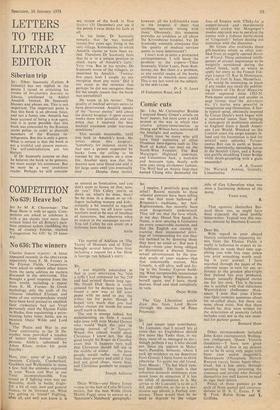LETTERS TO THE LITERARY • EDITOR
Siberian trip
Sir: Tibor Szamuely (Letters 9 January) has not replied to the points 1 raised in criticising his review of Involuntary Journey to Siberia, attributed to Andrei Amalrik. Instead, Dr Szamuely blusters and abuses me. This is not important. The important point is that this book is an obvious hoax, and not a funny one. Amalrik has been accused of being a KGB agent, and it is quite possible that this book was concocted by the Russian secret police, in order to discredit members of the Russian in- telligentsia. But this is only a guess. What is certain is that the book is not a truthful and sincere memoir. The self-contradictions are too blatant.
If Dr Szamuely assures us that he believes the book to be genuine, we must accept his assurance. But he must be a very credulous reader. Perhaps he will consider
my review of the book in New Society (31 DeceMber) and see if the points 1 raise shake his faith at a 11.
In his letter, Dr Szamuely remarks that he was himself twenty-five years ago, living in the very village, Krivosheino, to which Amalrik claims to have been ex- iled. Therefore Dr Szamuely feels that he is 'in a unique position to check many of Amalrik's facts.' Very true. But in his review, Dr Szamuely wrote of the villagers, as described by Amalrik: 'Twenty- five years later I simply do not recognise them any more.' Did it not occur to the reviewer that perhaps he did not recognise them for the simple reason that the book was untruthful?
He wrote in his review: 'The quality of medical services seems to have deteriorated. Amalrik speaks of the "horror stories" told about the district hospital-1 spent several weeks there with jaundice, and can attest that I received the best medical treatment under war-time conditions.'
This sounds reasonable, until you look at Amalrik's book. He writes about this hospital: 'Somebody, for instance, swore he had seen a patient suspended by hooks from the ceiling to be roasted by the doctors on a slow fire. Another story was that the doctors took your blood and sold it for large sums until you eventually died . . . Despite these stories, however, all the kolkhozniks went to the hospital if there was anything seriously wrong with them.' Obviously, this nonsense provides no evidence at all about the Krivosheino hospital. Yet Dr Szamuely solemnly concludes that 'the quality of medical services seems to have deteriorated'!
I don't wish to enter a protracted correspondence. I will leave the problem to the experts—Tibor Szamuely, Victor Louis, Peter Red- daway, etc. But there is a problem, as any careful reader of the books attributed to Amalrik must admit. This is my last word on the subject, in the SPECTATOR.
D. A. N. Jones 19 Endymion Road, sw2










































 Previous page
Previous page